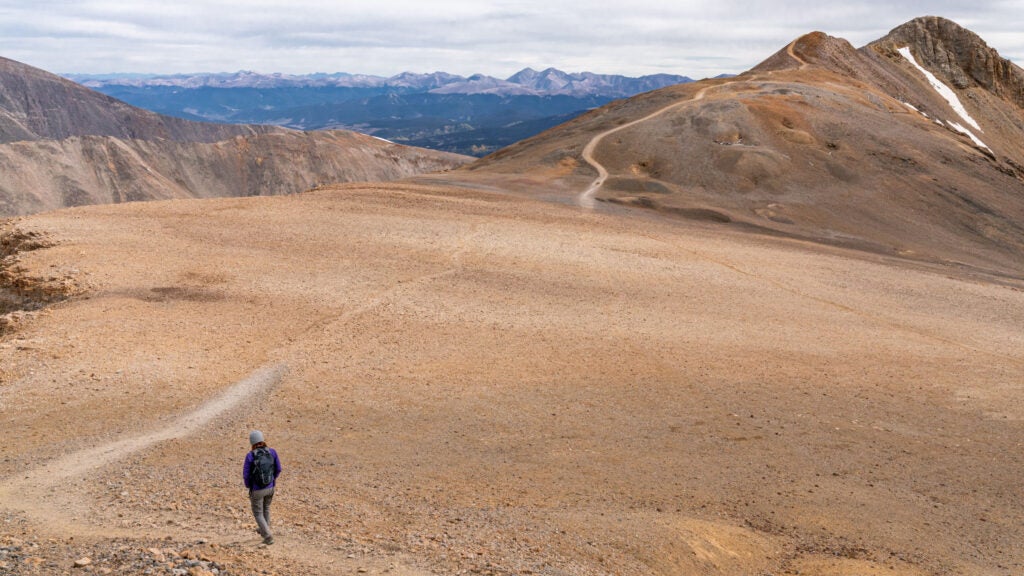Products You May Like
Get full access to Outside Learn, our online education hub featuring in-depth fitness, nutrition, and adventure courses and more than 2,000 instructional videos when you sign up for Outside+
Sign up for Outside+ today.
A landowner plans to close access to two of Colorado’s most popular fourteeners after a state senate committee killed a bill that would have reduced property owners’ liability for injuries occurring on their property.
John Reiber’s property includes large portions of the Decalibron Loop, a 7-mile trail outside of Alma, Colorado, that crosses four fourteeners: Democrat, Cameron, Lincoln, and Bross. Approximately 30,000 hikers tackle the loop every year. Reiber, whose father began amassing mining claims in the area in the 1950s, owns the only access to the summits of Democrat and Lincoln. (Bross’s private owners don’t allow access to the summit; Cameron is publicly owned). With the exception of a closure from 2004 to 2006, and another brief one in 2021, Reiber has kept access to the peaks mostly open through a partnership with the local government, the Forest Service, and Colorado hiking groups.
But the delicate agreement keeping the trail accessible began to wobble back in 2014, with the initial verdict in Nelson v. United States, a civil case brought against the government by James Nelson, a cyclist who suffered severe injuries when he rode into a sinkhole on a path on U.S. Air Force Academy property. A court found that the government was liable for Nelson’s injuries because it knew that the hole existed and hadn’t put up signage or repaired it, and awarded the plaintiff $7.3 million in damages.
Traditionally, Colorado state law has granted private landowners who allow free recreational access to their property broad protections from liability for accidents that hikers or bikers suffered there. But after an appeals court confirmed the award to Nelson in 2019, the calculus began to change for Reiber and some other large landowners, some of whose property includes old mineshafts and other preexisting hazards. Stakeholders such as the Colorado Fourteeners Initiative (CFI) and Alma’s local government attempted to ease landowners’ worries through outreach and installing no trespassing signs to keep hikers on trail. Still, concerns persisted: In 2021, Reiber briefly shut down the Decalibron Loop, citing reports of hikers ignoring signage, accessing closed areas, and even breaking into old mining infrastructure.
SB23-103 was meant to resolve landowners’ concerns by strengthening their immunity from lawsuits. Sponsored by state Sen. Mark Baisley, whose district includes Alma, the bill would have removed an exception from the Colorado Recreational Use Statute (CRUS) that allowed injured recreators to sue landowners over a “willful” failure to warn about or guard against a known hazard.
The Colorado Trial Lawyers Association and two additional attorneys, including Nelson’s, testified against the bill, arguing that amending the law would send a message to hikers that Colorado didn’t care about their safety. On the other side, nearly 30 groups supported the measure, including CFI, the Colorado Mountain Club, Continental Divide Trail Coalition, and American Alpine Club. On March 1, the Senate Judiciary Committee killed the bill on a party-line vote, with the committee’s two Republicans voting in favor of the measure and its three Democrats voting against it.
In response, Reiber told Colorado Sun reporter Jason Blevins that he planned to close Democrat and Lincoln to hikers.
“I can no longer take on the level of risk in case someone gets hurt and wants to sue me,” Reiber said, noting that he was unable to get insurance in the wake of the Nelson decision.
Brian Sargeant, development and communications manager for CFI, testified in support of the bill. He said that while the news of the peaks’ closure was disappointing, he couldn’t blame Reiber for no longer wanting to run the legal liability necessary to keep them open.
“In [Reiber’s] testimony he stated that he’s kept these peaks open for several years despite his attorney’s advice to close them to the public,” Sergeant wrote in an email to Backpacker. “Reiber wanted to provide access to these mountains but he doesn’t feel that the current Colorado Recreational Use Statute would provide protection after the decision made in Nelson v. United States.”
Hikers who come to bag fourteeners have been critical to Alma’s economy. CFI estimates that the 2021 closure, which reduced the number of hikers on the Decalibron Loop by about 20,000, cost the town roughly $5 million in lost revenue. Sargeant suggests that closures and the resulting loss of income may motivate skeptical legislators to support revisions to the CRUS in the future.
In the meantime, he said, CFI will continue to pursue alternative strategies for reopening privately owned fourteeners to hikers.
“At the moment, other paths forward for some privately owned 14ers might include access easements and even transfer of ownership. These would be major efforts involving participation from all stakeholders.”
Speaking to the Colorado Sun, Baisley said that he plans to introduce another bill to update landowner liability protections in next year’s section, and that he’s hopeful supporters and opponents of the measure can reach a compromise.
